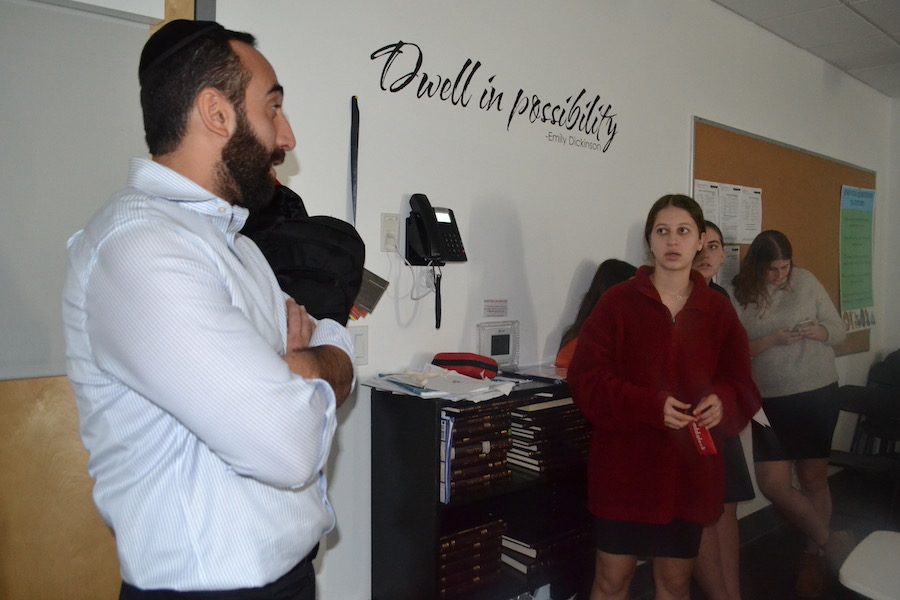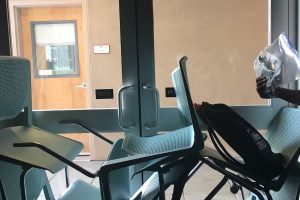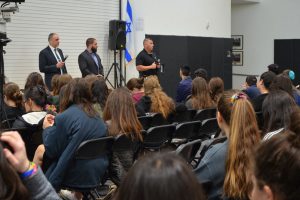Second lockdown drill sets agenda for more security improvements
Officials say weaknesses found are easily corrected
PROTECT: Dean of Student Life Mr. Jonny Ravanshenas and students hid in a locked classroom practicing what to do in case of a shooter . Security officials said Dec. 20 drill would build community ‘muscle memory.’
Students spent 10 minutes hiding under desks and behind walls, noticing what worked and what didn’t, and generally feeling vulnerable during the school’s second-ever lockdown drill Dec. 20.
But while some students felt nervous, school and city security officials said the exercise would enhance their safety by providing lessons to ensure the school is safer in the future.
The drill began at 10:18 a.m. and ended at 10:28 a.m. The entire school was involved, including students and teachers involved in the annual Red Cross blood drive which was going on that day in the gym.
Although everyone had been told the day before what to do during the drill, both students and staff found flaws in the execution. For example, announcements over the PA system could not be heard in most of the school — a byproduct of the volume not having been tested since a new system was put in last summer, something that can be immediately fixed, officials said.
In fact, discovering such problems was deemed by administration to be a sign of the drill’s success. Mr. Ivan Wolkind, head of the Community Security Initiative at the Los Angeles Jewish Federation, said he was pleased.
“There are two things we wanted to achieve,” said Mr. Wolkind, who works closely with the security team at Shalhevet and is also a former member of the Los Angeles Police Department.
“One is to get people a little bit of muscle memory to do it once or twice,” he said after the drill was over. “I think we achieved that. And we’re getting really good feedback on what people saw — what worked, what didn’t work, where we could make improvements.
“We’re looking internally at what we can do,” he added. “So I think it was a really good drill. I think it went very smoothly. And I think the next one will go even more smoothly.”
Still, many students said that they were more afraid after the drill than they had been before.
The most widespread problem was with the PA system, which broadcast the message initiating the drill. It was only barely audible in every room on the third floor and some on the second, according to Boiling Point staff in all grades and many different classrooms. Many students in those areas did not know that the drill started.
“Honestly I felt unsafe, because I wouldn’t have been able to hear,” said junior Adam Tizabi. “The only reason I heard it was because the door was open as the announcement went off.”
“The security team is focused on keeping our school community safe, and is constantly evaluating and enhancing our security protocols and posture to do so.
— Sarah Emerson, Executive Director
There was also an issue of not being able to hear the message that ended the drill.
“We didn’t hear the ‘all clear’ and have been sitting on the floor for 10 minutes when we could have been doing class,” said sophomore Max Wintner during the drill, who was in a classroom on the third floor.
School Chief Operating Officer Ms. Sarah Emerson said the problem was that the school’s new phone system, which broadcasts the message, had not been tested yet.
One thing that was intentionally different this year was student preparation. At the school’s first-ever lockdown drill on March 20, students were unaware that it would occur and few knew what the codeword was, When the intercom — which however was much easier to hear last year — gave the signal, most students wondered what it meant.
This time, students had been prepared by Town Hall the day before, when the school’s the security team announced it and gave many instructions, including how the students would know the drill would start.
Ms. Emerson said that in response to last year’s drill, the school also had added more medical backpacks and expanded its surveillance system. Now, she, Head of School Rabbi Ari Segal, Director of Facilities Lili Einalhori and Assistant to the Head of School Mrs. Muriel Ohana have access to camera feeds both inside and outside the school. This improves detection of a possible intruders more, she said, than measures such as locks which are meant to delay them.
She said she realized flaws were exposed in the security system but that the drill would improve how threats will be handled in the future.
“I think the students and faculty largely handled the drill very well, and most importantly, our security team was pleased with it,” said Ms. Emerson in an interview.
Ms. Emerson said that she recognizes that students feel vulnerable, but said the effort that Shalhevet’s security team puts in to ensure students’ safety includes armed guards and cameras throughout the building.
“I would want the students to know and understand how seriously we take their safety and security,” said Ms. Emerson. “The security team is focused on keeping our school community safe, and is constantly evaluating and enhancing our security protocols and posture to do so.“
Ms. Emerson also said that while the administration wants to make Shalhevet as safe as possible, it also wants to maintain the school’s open atmosphere and not add measures which make the school “feel like a prison.”
Details of safety protocols and vulnerabilities in specific rooms have not been described in this article per the wishes of the administration and to not jeopardize the school’s safety.
Get the latest from The Boiling Point. Sign up for our news feed.

Jacob Joseph Lefkowitz Brooks was editor-in-chief during the 2019-20 school year and is now a student at the University of Toronto.








